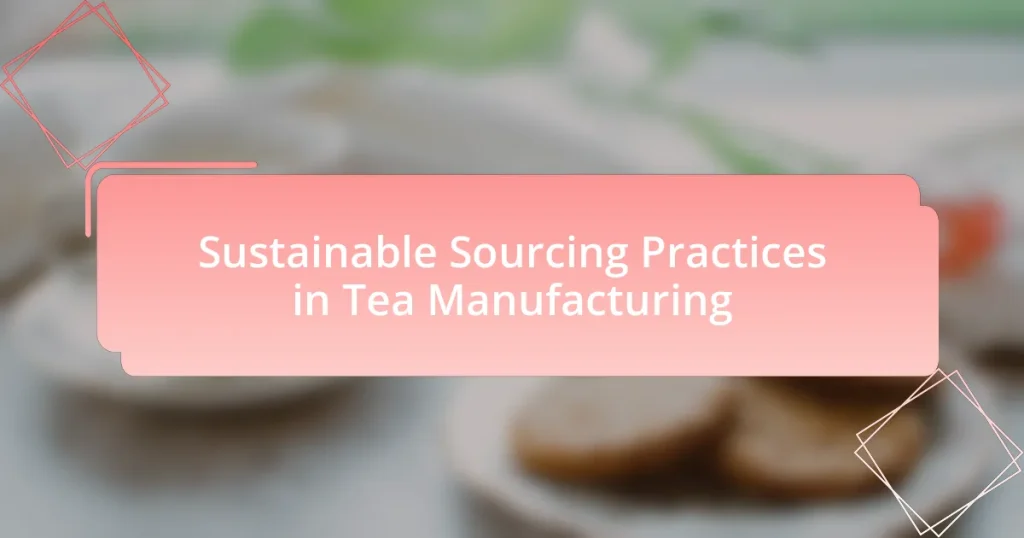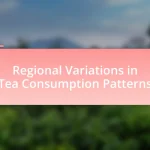Sustainable sourcing practices in tea manufacturing prioritize environmental health, social equity, and economic viability. These practices include sourcing from certified organic farms, ensuring fair wages for farmers through fair trade certifications, and implementing water conservation techniques. The article discusses the importance of sustainable sourcing in mitigating environmental impacts associated with traditional tea production, such as deforestation and soil degradation, while also benefiting local communities economically. Key principles of sustainable sourcing, challenges faced by manufacturers, and the role of certifications and technology in enhancing sustainability are also explored, highlighting the long-term advantages for both the tea industry and the environment.

What are Sustainable Sourcing Practices in Tea Manufacturing?
Sustainable sourcing practices in tea manufacturing involve methods that prioritize environmental health, social equity, and economic viability. These practices include sourcing tea from certified organic farms, which avoid synthetic pesticides and fertilizers, thereby protecting biodiversity and soil health. Additionally, fair trade certifications ensure that farmers receive fair wages and work under safe conditions, promoting social equity. According to the Rainforest Alliance, sustainable tea sourcing can reduce deforestation and promote ecosystem conservation, as it encourages responsible land management. Furthermore, implementing water conservation techniques during cultivation and processing minimizes water usage, addressing the critical issue of water scarcity in tea-growing regions.
Why is sustainable sourcing important in the tea industry?
Sustainable sourcing is important in the tea industry because it ensures environmental protection, social equity, and economic viability. By adopting sustainable practices, tea producers can minimize deforestation, conserve water, and reduce pesticide use, which contributes to biodiversity and ecosystem health. For instance, the Rainforest Alliance reports that sustainable tea farming can lead to a 30% reduction in chemical inputs, promoting healthier soil and water systems. Additionally, sustainable sourcing supports fair labor practices, ensuring that workers receive fair wages and safe working conditions, which is crucial for community development. This holistic approach not only enhances the quality of tea but also meets the growing consumer demand for ethically produced products, thereby driving market growth.
What environmental impacts are associated with traditional tea sourcing?
Traditional tea sourcing is associated with several environmental impacts, including deforestation, soil degradation, and water pollution. Deforestation occurs as land is cleared for tea plantations, leading to habitat loss for biodiversity and contributing to climate change. Soil degradation results from the use of chemical fertilizers and pesticides, which can diminish soil fertility and disrupt local ecosystems. Additionally, water pollution arises from agricultural runoff containing these chemicals, contaminating nearby water sources and affecting aquatic life. These impacts highlight the need for sustainable sourcing practices in tea manufacturing to mitigate environmental harm.
How does sustainable sourcing benefit local communities?
Sustainable sourcing benefits local communities by promoting economic stability and environmental health. When tea manufacturers engage in sustainable sourcing, they often prioritize local suppliers and farmers, which enhances local economies through job creation and fair wages. For instance, studies have shown that sustainable practices can increase farmers’ incomes by up to 30%, as they receive better prices for their organic and ethically produced tea. Additionally, sustainable sourcing encourages the preservation of local ecosystems, which supports biodiversity and ensures that communities have access to clean water and fertile land. This holistic approach not only uplifts the economic conditions of local communities but also fosters a healthier environment for future generations.
What are the key principles of sustainable sourcing in tea manufacturing?
The key principles of sustainable sourcing in tea manufacturing include environmental stewardship, social responsibility, and economic viability. Environmental stewardship focuses on minimizing ecological impact through practices such as organic farming, biodiversity conservation, and efficient water usage. Social responsibility emphasizes fair labor practices, community engagement, and support for local economies, ensuring that workers receive fair wages and safe working conditions. Economic viability ensures that tea production is profitable for farmers while maintaining sustainable practices, often supported by certifications like Fair Trade and Rainforest Alliance. These principles collectively promote a holistic approach to sustainability in the tea industry, fostering long-term benefits for the environment, communities, and businesses.
How do ethical labor practices play a role in sustainable sourcing?
Ethical labor practices are essential in sustainable sourcing as they ensure fair treatment and compensation for workers, which directly impacts the quality and sustainability of the sourced products. In tea manufacturing, implementing ethical labor practices helps to create a stable workforce, reduces turnover, and enhances productivity, ultimately leading to higher quality tea. For instance, according to the Ethical Tea Partnership, tea producers that adhere to ethical labor standards report improved worker satisfaction and better product quality, demonstrating a clear link between ethical practices and sustainable sourcing outcomes.
What methods are used to ensure environmental sustainability in tea cultivation?
Methods used to ensure environmental sustainability in tea cultivation include organic farming, agroforestry, integrated pest management, and water conservation practices. Organic farming eliminates synthetic fertilizers and pesticides, promoting soil health and biodiversity. Agroforestry integrates tea plants with trees, enhancing ecosystem services and carbon sequestration. Integrated pest management employs biological controls and natural predators to minimize chemical use, reducing environmental impact. Water conservation practices, such as rainwater harvesting and drip irrigation, optimize water use and protect local water resources. These methods collectively contribute to sustainable tea production while preserving the environment.
What challenges do tea manufacturers face in implementing sustainable sourcing?
Tea manufacturers face significant challenges in implementing sustainable sourcing, primarily due to the complexity of supply chains and the need for compliance with various sustainability standards. The diverse geographical locations of tea production, often in developing countries, complicate traceability and verification of sustainable practices. Additionally, many smallholder farmers lack access to resources and training necessary for sustainable farming methods, which hinders their ability to meet certification requirements. Economic pressures also play a role, as manufacturers may prioritize cost over sustainability, leading to a reliance on cheaper, non-sustainable sources. According to a report by the International Tea Committee, over 60% of tea producers struggle with the financial implications of transitioning to sustainable practices, highlighting the economic barriers that impede widespread adoption of sustainable sourcing in the tea industry.
How do economic factors influence sustainable sourcing practices?
Economic factors significantly influence sustainable sourcing practices by determining the cost-effectiveness and feasibility of implementing environmentally friendly methods. For instance, fluctuations in raw material prices can compel tea manufacturers to prioritize cheaper, less sustainable sourcing options to maintain profit margins. Additionally, consumer demand for ethically sourced products can drive companies to invest in sustainable practices, as evidenced by a 2021 study from the International Institute for Sustainable Development, which found that 70% of consumers are willing to pay more for sustainably sourced tea. This economic incentive encourages manufacturers to adopt practices that align with sustainability goals while remaining competitive in the market.
What barriers exist for small-scale tea producers in adopting sustainable methods?
Small-scale tea producers face several barriers in adopting sustainable methods, primarily due to financial constraints, lack of access to information, and limited market opportunities. Financial constraints hinder these producers from investing in sustainable practices, as they often operate on tight margins and lack access to credit or funding. Additionally, many small-scale producers do not have access to information about sustainable farming techniques or certification processes, which can impede their ability to implement these methods effectively. Furthermore, limited market opportunities for sustainably produced tea can discourage producers from transitioning, as they may not see a sufficient return on investment. These barriers collectively inhibit the adoption of sustainable practices among small-scale tea producers.
How can tea manufacturers effectively implement sustainable sourcing practices?
Tea manufacturers can effectively implement sustainable sourcing practices by establishing direct relationships with farmers, ensuring fair trade, and adopting environmentally friendly cultivation methods. Direct relationships with farmers allow manufacturers to monitor agricultural practices and promote sustainable techniques, such as organic farming and agroforestry, which enhance biodiversity and soil health. Fair trade initiatives ensure that farmers receive equitable compensation, fostering economic stability and encouraging sustainable practices. According to the Fair Trade Foundation, certified producers earn up to 20% more than conventional farmers, incentivizing them to adopt sustainable methods. Additionally, implementing certifications like Rainforest Alliance or USDA Organic can help manufacturers validate their commitment to sustainability, as these certifications require adherence to strict environmental and social standards.
What certifications should tea manufacturers seek for sustainable sourcing?
Tea manufacturers should seek certifications such as Rainforest Alliance, Fair Trade, and USDA Organic for sustainable sourcing. These certifications ensure that tea is produced in environmentally friendly ways, promotes fair labor practices, and adheres to organic farming standards. For instance, the Rainforest Alliance certification focuses on biodiversity conservation and sustainable livelihoods, while Fair Trade certification guarantees fair wages and working conditions for farmers. USDA Organic certification verifies that tea is grown without synthetic pesticides or fertilizers, promoting ecological balance. These certifications collectively enhance the credibility of tea manufacturers in the sustainable sourcing landscape.
How can technology aid in improving sustainable sourcing in tea production?
Technology can significantly improve sustainable sourcing in tea production by enabling better traceability and transparency throughout the supply chain. For instance, blockchain technology allows for the secure tracking of tea from the farm to the consumer, ensuring that sourcing practices meet sustainability standards. A study by the International Tea Committee highlights that implementing digital platforms for monitoring agricultural practices can reduce environmental impact by promoting organic farming methods and minimizing pesticide use. Additionally, data analytics can optimize resource management, leading to more efficient water and energy use in tea cultivation. These technological advancements not only enhance sustainability but also build consumer trust in the sourcing of tea products.

What are the benefits of sustainable sourcing practices in tea manufacturing?
Sustainable sourcing practices in tea manufacturing provide environmental, economic, and social benefits. Environmentally, these practices reduce deforestation and promote biodiversity by encouraging the cultivation of tea in ways that protect ecosystems. Economically, sustainable sourcing can lead to cost savings through efficient resource use and can enhance market access, as consumers increasingly prefer ethically sourced products. Socially, these practices improve the livelihoods of tea farmers by ensuring fair wages and better working conditions, which can be evidenced by initiatives like Fair Trade certification that support community development.
How does sustainable sourcing impact product quality?
Sustainable sourcing enhances product quality by ensuring that raw materials are obtained through environmentally friendly and ethical practices. This approach often leads to higher-quality ingredients, as sustainable methods prioritize soil health, biodiversity, and responsible farming techniques. For instance, research published in the Journal of Cleaner Production indicates that tea produced through sustainable practices exhibits superior flavor profiles and higher antioxidant levels compared to conventionally sourced tea. This improvement in quality is attributed to the careful cultivation methods and reduced chemical inputs associated with sustainable sourcing.
What role does consumer demand play in promoting sustainable tea sourcing?
Consumer demand significantly drives sustainable tea sourcing by influencing producers to adopt environmentally friendly practices. As consumers increasingly prioritize sustainability, they seek products that are ethically sourced, prompting tea manufacturers to implement sustainable farming methods, such as organic cultivation and fair trade practices. Research indicates that 66% of global consumers are willing to pay more for sustainable brands, which incentivizes producers to align their practices with consumer preferences. This shift not only enhances the marketability of tea products but also contributes to the preservation of ecosystems and the welfare of farming communities.
How can sustainable sourcing enhance brand reputation in the tea market?
Sustainable sourcing enhances brand reputation in the tea market by demonstrating a commitment to ethical practices and environmental stewardship. Brands that prioritize sustainable sourcing often attract environmentally conscious consumers, leading to increased customer loyalty and positive brand perception. For instance, a study by the Ethical Tea Partnership found that 70% of consumers are more likely to purchase products from brands that are committed to sustainability. Additionally, sustainable sourcing can reduce risks associated with supply chain disruptions and improve product quality, further solidifying a brand’s reputation as a responsible and reliable choice in the tea market.
What economic advantages does sustainable sourcing offer to tea manufacturers?
Sustainable sourcing offers economic advantages to tea manufacturers by reducing costs associated with resource depletion and enhancing market competitiveness. By implementing sustainable practices, manufacturers can lower input costs through efficient resource management, such as water and energy conservation, which can lead to significant savings. Additionally, sustainable sourcing can improve brand reputation and consumer loyalty, as more consumers prefer products that are environmentally friendly. A study by the World Economic Forum indicates that companies adopting sustainable practices can experience up to a 20% increase in sales due to heightened consumer demand for ethical products. This combination of cost savings and increased revenue positions tea manufacturers favorably in a competitive market.
How can cost savings be achieved through sustainable practices?
Cost savings can be achieved through sustainable practices by reducing waste, optimizing resource use, and enhancing operational efficiency. For instance, implementing energy-efficient technologies in tea manufacturing can lower energy costs significantly; studies show that energy-efficient practices can reduce energy consumption by up to 30%. Additionally, sustainable sourcing of raw materials can lead to lower procurement costs, as local sourcing minimizes transportation expenses and supports community economies. Furthermore, adopting practices such as water conservation can decrease water usage costs, with companies reporting savings of 20-50% in water bills after implementing efficient water management systems. These strategies not only contribute to financial savings but also promote long-term sustainability in the tea industry.
What are the long-term financial benefits of sustainable sourcing?
Sustainable sourcing in tea manufacturing provides long-term financial benefits such as cost savings, enhanced brand loyalty, and access to new markets. By implementing sustainable practices, companies can reduce operational costs through efficient resource management, such as minimizing waste and energy consumption. For instance, a study by the World Economic Forum found that companies adopting sustainable sourcing can achieve up to a 20% reduction in supply chain costs over time. Additionally, consumers increasingly prefer brands that demonstrate environmental responsibility, leading to increased customer loyalty and potentially higher sales. According to Nielsen, 66% of global consumers are willing to pay more for sustainable brands, which can significantly boost revenue. Furthermore, sustainable sourcing opens opportunities in emerging markets that prioritize ethical practices, thus expanding the customer base and driving long-term profitability.
How does sustainable sourcing contribute to biodiversity and ecosystem health?
Sustainable sourcing contributes to biodiversity and ecosystem health by promoting practices that protect natural habitats and reduce environmental degradation. By prioritizing the use of organic farming methods and agroforestry, sustainable sourcing minimizes chemical inputs, which can harm local flora and fauna. For instance, studies have shown that organic tea farms can support higher levels of biodiversity compared to conventional farms, with a 30% increase in species richness observed in organic systems. Additionally, sustainable sourcing often involves fair trade practices that empower local communities to manage their resources responsibly, further enhancing ecosystem resilience. This holistic approach not only preserves biodiversity but also fosters healthier ecosystems, ensuring long-term sustainability in tea manufacturing.
What practices can tea manufacturers adopt to protect local ecosystems?
Tea manufacturers can adopt agroforestry practices to protect local ecosystems. By integrating tea cultivation with tree planting, manufacturers can enhance biodiversity, improve soil health, and reduce erosion. Research indicates that agroforestry systems can increase species richness by up to 50% compared to monoculture tea plantations, thereby supporting local wildlife and maintaining ecological balance. Additionally, implementing organic farming techniques minimizes chemical runoff, which protects water quality and local flora and fauna. These practices not only safeguard ecosystems but also contribute to sustainable tea production, aligning with consumer demand for environmentally friendly products.
How does sustainable sourcing support wildlife conservation efforts?
Sustainable sourcing supports wildlife conservation efforts by promoting practices that minimize habitat destruction and protect biodiversity. For instance, sustainable tea farming often involves maintaining natural ecosystems, which provides habitats for various species. Research indicates that sustainable agricultural practices can lead to a 30% increase in biodiversity compared to conventional farming methods. By prioritizing environmentally friendly sourcing, companies can reduce the negative impact on wildlife and contribute to the preservation of endangered species and their habitats.

What are the future trends in sustainable sourcing for tea manufacturing?
Future trends in sustainable sourcing for tea manufacturing include increased adoption of agroecological practices, enhanced traceability through blockchain technology, and a focus on fair trade certifications. Agroecological practices, which prioritize biodiversity and soil health, are gaining traction as they contribute to environmental sustainability and resilience against climate change. Blockchain technology is being utilized to improve traceability, allowing consumers to verify the origins of their tea and ensuring ethical sourcing. Additionally, the demand for fair trade certifications is rising, as consumers increasingly prefer products that support equitable labor practices and community development. These trends reflect a broader shift towards transparency and responsibility in the tea supply chain, driven by consumer awareness and regulatory pressures.
How is consumer awareness influencing sustainable sourcing trends?
Consumer awareness is significantly influencing sustainable sourcing trends by driving demand for ethically produced and environmentally friendly products. As consumers become more informed about the environmental and social impacts of their purchases, they increasingly prefer brands that prioritize sustainability in their sourcing practices. For instance, a 2021 survey by Nielsen found that 73% of global consumers are willing to change their consumption habits to reduce their environmental impact, highlighting a clear shift towards sustainability. This heightened awareness compels tea manufacturers to adopt sustainable sourcing methods, such as fair trade practices and organic farming, to meet consumer expectations and maintain market competitiveness.
What innovations are emerging in sustainable tea sourcing practices?
Innovations in sustainable tea sourcing practices include blockchain technology for traceability, agroforestry systems for biodiversity, and the use of artificial intelligence for optimizing supply chains. Blockchain technology enhances transparency by allowing consumers to trace the origin of tea, ensuring ethical sourcing. Agroforestry systems integrate tea cultivation with other crops, promoting biodiversity and improving soil health. Artificial intelligence analyzes data to streamline sourcing processes, reducing waste and improving efficiency. These innovations collectively contribute to more sustainable practices in the tea industry.
How are global policies shaping the future of sustainable sourcing in tea?
Global policies are significantly influencing the future of sustainable sourcing in tea by establishing frameworks that promote environmental protection and social responsibility. For instance, the European Union’s Green Deal aims to make Europe climate-neutral by 2050, which includes regulations that encourage sustainable agricultural practices, directly impacting tea sourcing. Additionally, the United Nations’ Sustainable Development Goals (SDGs) advocate for responsible consumption and production patterns, urging tea producers to adopt sustainable methods. These policies are backed by research indicating that sustainable sourcing can enhance biodiversity and improve the livelihoods of farmers, as seen in studies conducted by the Rainforest Alliance, which show that certified tea farms yield better economic outcomes for local communities.
What role do certifications and standards play in the future of sustainable tea sourcing?
Certifications and standards are crucial for the future of sustainable tea sourcing as they provide a framework for environmental and social responsibility. These certifications, such as Rainforest Alliance and Fair Trade, ensure that tea producers adhere to specific practices that promote ecological balance, fair labor conditions, and community development. For instance, the Rainforest Alliance certification requires farms to implement practices that protect biodiversity and conserve water, which directly contributes to sustainability. Furthermore, adherence to these standards can enhance market access and consumer trust, as buyers increasingly prefer products that are certified sustainable. According to a 2021 report by the International Tea Committee, the demand for certified tea has been rising, indicating that certifications will play an essential role in shaping sourcing practices and driving the industry towards more sustainable methods.
How can manufacturers prepare for evolving sustainability standards?
Manufacturers can prepare for evolving sustainability standards by implementing comprehensive sustainability assessments and adopting best practices in sourcing. Conducting regular evaluations of supply chains helps identify areas for improvement, ensuring compliance with emerging regulations. For instance, the Global Reporting Initiative (GRI) provides frameworks that guide manufacturers in measuring their sustainability performance, which can lead to enhanced transparency and accountability. Additionally, engaging with stakeholders, including suppliers and consumers, fosters collaboration and innovation in sustainable practices, aligning with the increasing demand for environmentally friendly products.
What are the implications of new certifications for tea producers?
New certifications for tea producers enhance market access and improve product quality. These certifications, such as Fair Trade and Rainforest Alliance, often lead to higher prices for certified tea, as consumers increasingly prefer sustainably sourced products. Additionally, certified producers may benefit from improved farming practices, which can lead to better yields and reduced environmental impact. For instance, a study by the International Institute for Environment and Development found that certified tea producers experienced a 20% increase in income compared to non-certified counterparts, demonstrating the financial benefits of adhering to these standards.
What practical steps can tea manufacturers take to enhance sustainable sourcing?
Tea manufacturers can enhance sustainable sourcing by implementing direct trade relationships with farmers, ensuring fair wages and working conditions. This approach fosters transparency and accountability in the supply chain, which is crucial for sustainability. Additionally, manufacturers can adopt organic farming practices that reduce chemical usage, thereby protecting biodiversity and soil health. According to the International Federation of Organic Agriculture Movements, organic farming can increase soil fertility and reduce pollution. Furthermore, investing in certifications such as Rainforest Alliance or Fair Trade can help ensure that sourcing practices meet environmental and social standards, promoting sustainability in the tea industry.
How can collaboration with NGOs improve sustainable sourcing efforts?
Collaboration with NGOs can significantly enhance sustainable sourcing efforts by leveraging their expertise in environmental and social governance. NGOs often possess in-depth knowledge of local ecosystems, community needs, and best practices for sustainable agriculture, which can guide tea manufacturers in implementing responsible sourcing strategies. For instance, partnerships with organizations like Rainforest Alliance have led to the adoption of certification programs that promote biodiversity and fair labor practices, resulting in improved supply chain transparency and sustainability. Additionally, NGOs can facilitate training programs for farmers, helping them adopt sustainable farming techniques that reduce environmental impact and improve crop yields. This collaborative approach not only fosters better relationships with local communities but also aligns sourcing practices with global sustainability goals, ultimately benefiting both the environment and the tea industry.
What best practices should be followed for effective sustainable sourcing in tea manufacturing?
Effective sustainable sourcing in tea manufacturing requires adherence to several best practices, including selecting certified suppliers, promoting fair labor practices, and implementing environmentally friendly agricultural methods. Certified suppliers, such as those holding Rainforest Alliance or Fair Trade certifications, ensure compliance with sustainability standards, which enhances the credibility of the sourcing process. Promoting fair labor practices protects workers’ rights and improves community welfare, as evidenced by Fair Trade’s impact on income stability for tea farmers. Additionally, implementing environmentally friendly agricultural methods, such as organic farming and integrated pest management, reduces chemical usage and conserves biodiversity, contributing to long-term ecological health. These practices collectively support a sustainable supply chain that benefits both producers and consumers.


